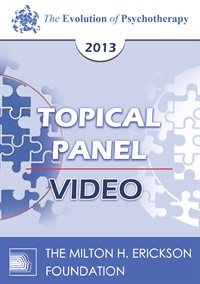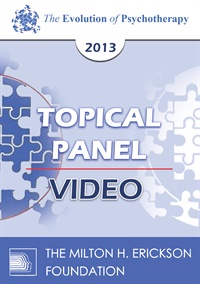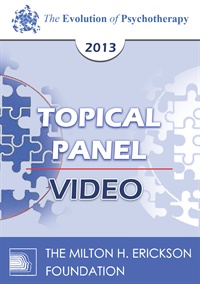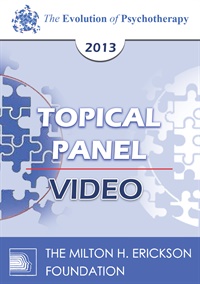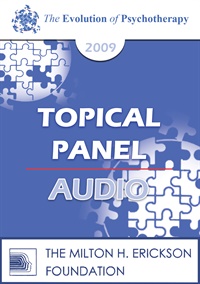
- Average Rating:
- Not yet rated
- Topic Areas:
- Psychotherapy | Topical Panels | Research
- Categories:
- Evolution of Psychotherapy | Evolution of Psychotherapy 2009
- Faculty:
- David Barlow, PhD | Steven Hayes, PhD | Scott Miller, PhD
- Duration:
- 1 Hour 2 Minutes
- Format:
- Audio Only
- Original Program Date:
- Dec 11, 2009
- Short Description:
- EP09 Topical Panel 04 – Research in Psychotherapy – David Barlow, Steven Hayes, and Scott Miller Educational Objective: To compare and contrast clinical and philosophical perspectives of experts
- Price:
- $15.00 - Base Price
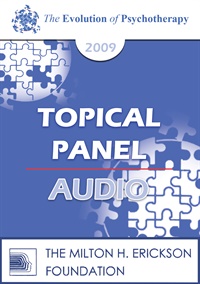
- Average Rating:
- Not yet rated
- Topic Areas:
- Post-Traumatic Stress Disorder (PTSD) | Topical Panels | Psychotherapy
- Categories:
- Evolution of Psychotherapy | Evolution of Psychotherapy 2009
- Faculty:
- Albert Bandura | Marsha Linehan, PhD | Donald Meichenbaum, PhD
- Duration:
- 1 Hour 3 Minutes
- Format:
- Audio Only
- Original Program Date:
- Dec 11, 2009
- Short Description:
- EP09 Topical Panel 05 – Post-Traumatic Disorders – Albert Bandura, Marsha Linehan, and Donald Meichenbaum Educational Objective: To compare and contrast clinical and philosophical perspectives of experts.
- Price:
- $15.00 - Base Price
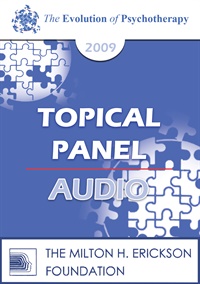
- Average Rating:
- Not yet rated
- Topic Areas:
- Couples Therapy | Topical Panels | Psychotherapy | Attachment | Communication | Conflict | Forgiveness | IMAGO
- Categories:
- Evolution of Psychotherapy | Evolution of Psychotherapy 2009 | Pioneers in Couples and Family Therapy
- Faculty:
- John Gottman, PhD | Julie Gottman, PhD | Michele Weiner-Davis, LCSW | Harville Hendrix, PhD
- Duration:
- 1 Hour
- Format:
- Audio Only
- Original Program Date:
- Dec 11, 2009
- Short Description:
- Leading voices in couples therapy explore diverse, evidence-informed approaches. The Gottmans draw from decades of research to explain the Sound Relationship House and how couples build intimacy through small, daily moments. Hendrix outlines the value of structured dialogue in healing relational wounds. Weiner-Davis highlights the power of action-based interventions that build skills and restore hope. Together, the panelists reflect on shared clinical values—like adaptability, warmth, and curiosity—and how these principles can guide therapists working with conflict, trauma, and differences in sexual desire.
- Price:
- $15.00 - Base Price
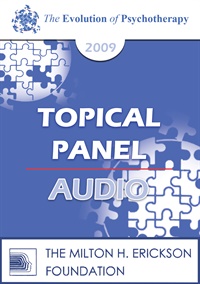
- Average Rating:
- Not yet rated
- Topic Areas:
- Meditation, Spirituality and Yoga | Topical Panels | Trauma | Mindfulness
- Categories:
- Evolution of Psychotherapy | Evolution of Psychotherapy 2009
- Faculty:
- Daniel Siegel, MD | Bessel van der Kolk, MD | Francine Shapiro, PhD | Jack Kornfield, PhD
- Duration:
- 55 Minutes
- Format:
- Audio Only
- Original Program Date:
- Dec 11, 2009
- Short Description:
- EP09 Topical Panel 08 – Mindfulness, Trauma, Healing and the Spirit – Bessel van der Kolk, Jack Kornfield, Daniel Siegel, and Francine Shapiro Educational Objective: To compare and contrast clinical and philosophical perspectives of experts.
- Price:
- $15.00 - Base Price
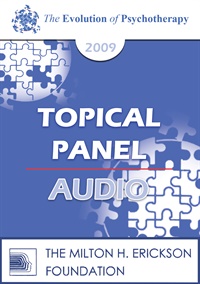
- Average Rating:
- Not yet rated
- Topic Areas:
- Topical Panels | Multicultural | Psychotherapy
- Categories:
- Evolution of Psychotherapy | Evolution of Psychotherapy 2009
- Faculty:
- Donald Meichenbaum, PhD | Derald Wing Sue, PhD | Jean Houston, PhD
- Duration:
- 57 Minutes
- Format:
- Audio Only
- Original Program Date:
- Dec 11, 2009
- Short Description:
- EP09 Topical Panel 09 – Cross-Cultural Issues – Jean Houston, Donald Meichenbaum, and Derald Wing Sue Educational Objective: To compare and contrast clinical and philosophical perspectives of experts.
- Price:
- $15.00 - Base Price
Tags: Multi-Cultural Psychotherapy
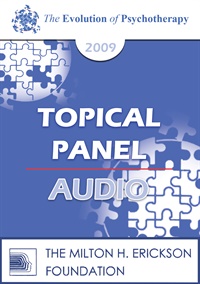
- Average Rating:
- Not yet rated
- Topic Areas:
- Depression | Topical Panels | Psychotherapy
- Categories:
- Evolution of Psychotherapy | Evolution of Psychotherapy 2009
- Faculty:
- Judith Beck, PhD | Francine Shapiro, PhD | Michael Yapko, PhD
- Duration:
- 55 Minutes
- Format:
- Audio Only
- Original Program Date:
- Dec 11, 2009
- Short Description:
- EP09 Topical Panel 10 – Depression – Judith Beck, Francine Shapiro, and Michael Yapko Educational Objective: To compare and contrast clinical and philosophical perspectives of experts.
- Price:
- $15.00 - Base Price
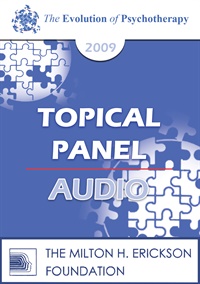
- Average Rating:
- Not yet rated
- Topic Areas:
- Suicide | Topical Panels | Psychotherapy | Community | Family Systems | Self-Esteem
- Categories:
- Evolution of Psychotherapy | Evolution of Psychotherapy 2009 | Pioneers in Couples and Family Therapy
- Faculty:
- James Hillman, PhD | Cloe Madanes, HDL, LIC
- Duration:
- 59 Minutes
- Format:
- Audio Only
- Original Program Date:
- Dec 11, 2009
- Short Description:
- This panel on suicidal behavior features case studies and insights on treating depression and chronic conditions through family therapy and creative interventions. Cloe Madanes highlights recovery through lifestyle reframing and paradoxical techniques, while James Hillman focuses on the deeper motives behind suicidal thoughts, such as revenge or risk. The discussion also examines ethical and societal dimensions, emphasizing community support and the balance between personal autonomy and social responsibility.
- Price:
- $15.00 - Base Price
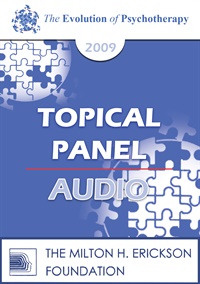
- Average Rating:
- Not yet rated
- Topic Areas:
- Topical Panels | Homework | Psychotherapy | Therapist Development | Intervention Strategies | Therapist Techniques
- Categories:
- Evolution of Psychotherapy | Evolution of Psychotherapy 2009 | Pioneers in Couples and Family Therapy
- Faculty:
- Claudia Black, PhD | Harville Hendrix, PhD | Harriet Lerner, PhD
- Duration:
- 56 Minutes
- Format:
- Audio Only
- Original Program Date:
- Dec 11, 2009
- Short Description:
- Three leading therapists discuss homework assignments in therapy, sharing insights on enhancing client engagement and personal growth. They examine different approaches to between-session activities, from bibliotherapy to skill-building exercises, emphasizing the importance of client accountability and creative interventions. The panel highlights how strategic assignments can help clients practice new communication skills, challenge relationship patterns, and accelerate therapeutic progress.
- Price:
- $15.00 - Base Price
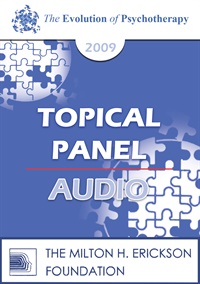
- Average Rating:
- Not yet rated
- Topic Areas:
- Psychotherapy | Topical Panels | Art and Creativity
- Categories:
- Evolution of Psychotherapy | Evolution of Psychotherapy 2009
- Faculty:
- Steven Hayes, PhD | James Hillman, PhD | Erving Polster, PhD
- Duration:
- 56 Minutes
- Format:
- Audio Only
- Original Program Date:
- Dec 12, 2009
- Short Description:
- EP09 Topical Panel 17 – Psychotherapy: Art or Science? – Steven Hayes, James Hillman, and Erving Polster Educational Objective: To compare and contrast clinical and philosophical perspectives of experts.
- Price:
- $15.00 - Base Price
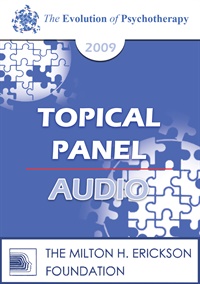
- Average Rating:
- Not yet rated
- Topic Areas:
- Topical Panels | Self-Relations | Solution Oriented Approach | Neuro-Linguistic Programming (NLP) | Psychotherapy | Brief Therapy | Couples Therapy | Ericksonian Hypnosis and Therapy Techniques | Milton Erickson
- Categories:
- Evolution of Psychotherapy | Evolution of Psychotherapy 2009 | Pioneers in Couples and Family Therapy
- Faculty:
- Robert Dilts, BA | Stephen Gilligan, PhD | Michele Weiner-Davis, LCSW
- Duration:
- 1 hour
- Format:
- Audio Only
- Original Program Date:
- Dec 12, 2009
- Short Description:
- This panel explores the legacy of Milton Erickson through the lenses of NLP, solution-focused therapy, and self-relations. Robert Dilts highlights Erickson’s process-based approach. Stephen Gilligan focuses on utilization and unconscious dynamics. Michele Weiner-Davis reflects on her shift toward resilience and directive strategies. The conversation also addresses agency challenges and the clinical role of self-disclosure.
- Price:
- $15.00 - Base Price
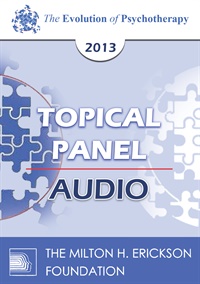
- Average Rating:
- Not yet rated
- Topic Areas:
- Topical Panels | Mind-Body | Psychotherapy
- Categories:
- Evolution of Psychotherapy | Evolution of Psychotherapy 2013
- Faculty:
- Robert Dilts, BA | Stephen Gilligan, PhD | Francine Shapiro, PhD
- Duration:
- 1 Hour 2 Minutes
- Format:
- Audio Only
- Original Program Date:
- Dec 13, 2013
- Short Description:
- EP13 Topical Panel 01 – Mind-Body Issues - Robert Dilts, Stephen Gilligan, PhD, and Francine Shapiro, PhD Moderator: Richard Landis, PhD Education Objectives: Compare and contrast clinical and philosophical perspective of experts.
- Price:
- $15.00 - Base Price
- Average Rating:
- Not yet rated
- Topic Areas:
- Children and Adolescent Therapy | Topical Panels | Psychotherapy
- Categories:
- Evolution of Psychotherapy | Evolution of Psychotherapy 2013
- Faculty:
- John Gottman, PhD | Donald Meichenbaum, PhD | Mary Pipher, PhD
- Course Levels:
- Master Degree or Higher in Health-Related Field
- Duration:
- 59:11
- Format:
- Audio and Video
- Original Program Date:
- Dec 13, 2013
- Short Description:
- EP13 Topical Panel 03 - Children and Adolescents - John Gottman, PhD, Donald Meichenbaum, PhD, and Mary Pipher, PhD Moderator: Robert Bohanske, PhD Education Objectives: Compare and contrast clinical and philosophical perspective of experts.
- Price:
-
Sale is $29.00
price reduced from Base Price - $59.00
- Average Rating:
- Not yet rated
- Topic Areas:
- Post-Traumatic Stress Disorder (PTSD) | Topical Panels | Psychotherapy
- Categories:
- Evolution of Psychotherapy | Evolution of Psychotherapy 2013
- Faculty:
- Jack Kornfield, PhD | Donald Meichenbaum, PhD | Mary Pipher, PhD
- Course Levels:
- Master Degree or Higher in Health-Related Field
- Duration:
- 58:17
- Format:
- Audio and Video
- Original Program Date:
- Dec 13, 2013
- Short Description:
- EP13 Topical Panel 05 - Posttraumatic Disorders - Jack Kornfield, PhD, Peter Levine, PhD, Donald Meichenbaum, PhD, and Mary Pipher, PhD Moderator: Annellen Simpkins, PhD Education Objectives: Compare and contrast clinical and philosophical perspective of experts.
- Price:
-
Sale is $29.00
price reduced from Base Price - $59.00
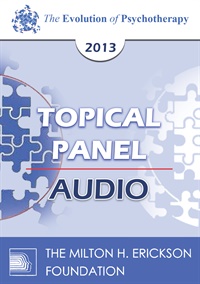
- Average Rating:
- Not yet rated
- Topic Areas:
- Topical Panels | Psychotherapy | Resistance | Cognitive Behavior Therapy (CBT) | Communication | Strategic Therapy
- Categories:
- Evolution of Psychotherapy | Evolution of Psychotherapy 2013 | Pioneers in Couples and Family Therapy
- Faculty:
- Judith Beck, PhD | Harriet Lerner, PhD | Cloe Madanes, HDL, LIC
- Duration:
- 59 Minutes
- Format:
- Audio Only
- Original Program Date:
- Dec 13, 2013
- Short Description:
- This panel examines resistance in therapy through varied lenses, emphasizing the need for flexibility and client-centered strategies. Beck stresses respecting resistance as a signal for deeper change, while Lerner highlights how behaviors can serve protective roles, even in crisis. Madanes introduces the use of leverage and paradox, showing how casual, empathetic connection can lead to transformation. The panel underscores adapting interventions to each client's unique context.
- Price:
- $15.00 - Base Price
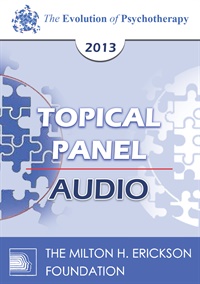
- Average Rating:
- Not yet rated
- Topic Areas:
- Psychotherapy | Topical Panels | Therapist Development | Training
- Categories:
- Evolution of Psychotherapy | Evolution of Psychotherapy 2013
- Faculty:
- Jon Carlson | Scott Miller, PhD | William Miller, PhD
- Duration:
- 1 Hour 4 Minutes
- Format:
- Audio Only
- Original Program Date:
- Dec 13, 2013
- Short Description:
- EP13 Topical Panel 07 - Training in Psychotherapy - Jon Carlson, PsyD, Scott Miller, PhD, and William Miller, PhD Moderator: Betty Alice Erickson, MS Education Objectives: Compare and contrast clinical and philosophical perspective of experts.
- Price:
- $15.00 - Base Price
- Average Rating:
- Not yet rated
- Topic Areas:
- Psychotherapy | Topical Panels | History of Psychotherapy
- Categories:
- Evolution of Psychotherapy | Evolution of Psychotherapy 2013
- Faculty:
- Albert Bandura | Nicholas Cummings, PhD | Otto Kernberg, MD
- Course Levels:
- Master Degree or Higher in Health-Related Field
- Duration:
- 58:00
- Format:
- Audio and Video
- Original Program Date:
- Dec 13, 2013
- Short Description:
- EP13 Topical Panel 08 - History of Psychotherapy - Albert Bandura, PhD, Nicholas Cummings, PhD, Otto Kernberg, MD, and Irvin Yalom, MD Moderator: Dan Short, PhD Education Objectives: Compare and contrast clinical and philosophical perspective of experts.
- Price:
-
Sale is $29.00
price reduced from Base Price - $59.00
- Average Rating:
- Not yet rated
- Topic Areas:
- Couples Therapy | Family Therapy | Topical Panels | Psychotherapy
- Categories:
- Evolution of Psychotherapy | Evolution of Psychotherapy 2013
- Faculty:
- Harville Hendrix, PhD | Sue Johnson, EdD | Harriet Lerner, PhD
- Course Levels:
- Master Degree or Higher in Health-Related Field
- Duration:
- 55:56
- Format:
- Audio and Video
- Original Program Date:
- Dec 13, 2013
- Short Description:
- EP13 Topical Panel 09 - Family and Couples Therapy - Harville Hendrix, PhD, Sue Johnson, EdD, and Harriet Lerner, PhD Moderator: Camillo Loriedo, MD, PhD Education Objectives: Compare and contrast clinical and philosophical perspective of experts.
- Price:
-
Sale is $29.00
price reduced from Base Price - $59.00
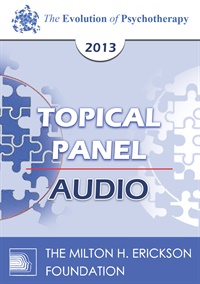
- Average Rating:
- Not yet rated
- Topic Areas:
- Topical Panels | Transference / Countertransference | Psychotherapy
- Categories:
- Evolution of Psychotherapy | Evolution of Psychotherapy 2013
- Faculty:
- Otto Kernberg, MD | Peter Levine, PhD | Erving Polster, PhD
- Duration:
- 1 Hour 1 Minutes
- Format:
- Audio Only
- Original Program Date:
- Dec 13, 2013
- Short Description:
- EP13 Topical Panel 10 - Transference/Countertransference - Otto Kernberg, MD, Peter Levine, PhD, and Erving Polster, PhD Moderator: Michael Munion, MA Education Objectives: Compare and contrast clinical and philosophical perspective of experts.
- Price:
- $15.00 - Base Price
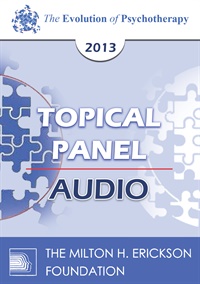
- Average Rating:
- Not yet rated
- Topic Areas:
- Psychotherapy | Topical Panels
- Categories:
- Evolution of Psychotherapy | Evolution of Psychotherapy 2013
- Faculty:
- Nicholas Cummings, PhD | Otto Kernberg, MD | Jeffrey Zeig, PhD
- Duration:
- 1 Hour 2 Minutes
- Format:
- Audio Only
- Original Program Date:
- Dec 13, 2013
- Short Description:
- EP13 Topical Panel 11 - The Evolution of Psychotherapy - Nicholas Cummings, PhD, Otto Kernberg, MD, and Jeffrey Zeig, PhD Moderator: Bernhard Trenkle, Dipl. Psych.
- Price:
- $15.00 - Base Price
Tags: Psychotherapy
- Average Rating:
- Not yet rated
- Topic Areas:
- Post-Traumatic Stress Disorder (PTSD) | Topical Panels | Psychotherapy
- Categories:
- Evolution of Psychotherapy | Evolution of Psychotherapy 2013
- Faculty:
- Bill O'Hanlon, MS | Francine Shapiro, PhD | Bessel van der Kolk, MD
- Course Levels:
- Master Degree or Higher in Health-Related Field
- Duration:
- 1:01:24
- Format:
- Audio and Video
- Original Program Date:
- Dec 13, 2013
- Short Description:
- EP13 Topical Panel 12 - Posttraumatic Disorders - Bill O’Hanlon, MS, Francine Shapiro, PhD, and Bessel van der Kolk, MD Moderator: Dan Short, PhD Education Objectives: Compare and contrast clinical and philosophical perspective of experts.
- Price:
-
Sale is $29.00
price reduced from Base Price - $59.00
- Average Rating:
- Not yet rated
- Topic Areas:
- Topical Panels | Multicultural | Psychotherapy
- Categories:
- Evolution of Psychotherapy | Evolution of Psychotherapy 2013
- Faculty:
- Robert Dilts, BA | Derald Wing Sue, PhD | Bessel van der Kolk, MD
- Course Levels:
- Master Degree or Higher in Health-Related Field
- Duration:
- 57:48
- Format:
- Audio and Video
- Original Program Date:
- Dec 14, 2013
- Short Description:
- EP13 Topical Panel 13 - Multicultural Issues - Robert Dilts, Derald Wing Sue, PhD, and Bessel van der Kolk, MD Moderator: Annellen Simpkins, PhD Education Objectives: Compare and contrast clinical and philosophical perspective of experts.
- Price:
-
Sale is $29.00
price reduced from Base Price - $59.00
- Average Rating:
- Not yet rated
- Topic Areas:
- Topical Panels | Abuse | Family Therapy | Psychotherapy | Addiction | Trauma
- Categories:
- Evolution of Psychotherapy | Evolution of Psychotherapy 2013 | Pioneers in Couples and Family Therapy
- Faculty:
- Claudia Black, PhD | Cloe Madanes, HDL, LIC | Julie Gottman, PhD
- Course Levels:
- Master Degree or Higher in Health-Related Field
- Duration:
- 58:16
- Format:
- Audio and Video
- Original Program Date:
- Dec 14, 2013
- Short Description:
- Discover powerful insights from three experts who unpack the realities of abuse in families affected by addiction. The panel examines abuse in families, revealing critical insights into physical and sexual violence within addictive households. Experts share groundbreaking research on domestic violence, juvenile sex offender treatment, and family healing strategies. Key findings include higher abuse rates in substance-abusing homes, innovative therapeutic interventions, and the importance of comprehensive family involvement in addressing trauma and preventing future violence.
- Price:
-
Sale is $29.00
price reduced from Base Price - $59.00
- Average Rating:
- Not yet rated
- Topic Areas:
- Couples Therapy | Family Therapy | Topical Panels | Psychotherapy | Family Systems | Strategic Therapy
- Categories:
- Evolution of Psychotherapy | Evolution of Psychotherapy 2013 | Pioneers in Couples and Family Therapy
- Faculty:
- John Gottman, PhD | Julie Gottman, PhD | Cloe Madanes, HDL, LIC
- Course Levels:
- Master Degree or Higher in Health-Related Field
- Duration:
- 58:52
- Format:
- Audio and Video
- Original Program Date:
- Dec 14, 2013
- Short Description:
- This panel compares approaches to family and couples therapy, blending Madanes’ focus on self-determination and action with Gottman’s Sound Relationship House Theory. Topics include divorce prevention, reversing family hierarchies, and emotion coaching for parenting. Emphasis is placed on practical tools, research-based strategies, and fostering resilience, with a shared commitment to goodwill, meaning, and long-term relationship success.
- Price:
-
Sale is $29.00
price reduced from Base Price - $59.00
- Average Rating:
- Not yet rated
- Topic Areas:
- Psychotherapy | Topical Panels | Research
- Categories:
- Evolution of Psychotherapy | Evolution of Psychotherapy 2013
- Faculty:
- David Barlow, PhD | Steven Hayes, PhD | Scott Miller, PhD
- Course Levels:
- Master Degree or Higher in Health-Related Field
- Duration:
- 59:47
- Format:
- Audio and Video
- Original Program Date:
- Dec 14, 2013
- Short Description:
- EP13 Topical Panel 16 - Research in Psychotherapy - David Barlow, PhD, Steven Hayes, PhD, and Scott Miller, PhD
- Price:
-
Sale is $29.00
price reduced from Base Price - $59.00
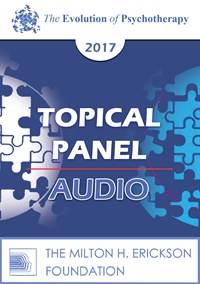
- Average Rating:
- Not yet rated
- Topic Areas:
- Topical Panels | Psychotherapy | Experiential Therapy | Therapist Development | Training
- Bundle(s):
- Learning Track - EP17 Psychotherapy Download
- Categories:
- Evolution of Psychotherapy | Evolution of Psychotherapy 2017 | Evolution of Psychotherapy Psychotherapy Learning Track
- Faculty:
- Donald Meichenbaum, PhD | Jeffrey Zeig, PhD | Scott Miller, PhD
- Duration:
- 1:01:43
- Format:
- Audio Only
- Original Program Date:
- Dec 15, 2017
- Short Description:
- Psychotherapists can be trained through didactic, research-based, and experiential approaches. These approaches will be compared and contrasted.
- Price:
- $15.00 - Base Price





